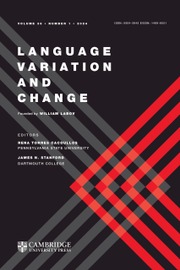Article contents
Domain minimization and beyond: Modeling prepositional phrase ordering
Published online by Cambridge University Press: 22 March 2013
Abstract
An important account of linear ordering in syntax is John A. Hawkins' (2004) theory of cognitive efficiency and the principles of domain minimization formulated therein. In its latest formulation, the theory postulates syntactic and semantic minimization principles. With regard to the relative strength of these principles, prior research into the dynamics of these constraints has come to differing conclusions. Using the relative ordering of prepositional phrases (PPs) in English as a test phenomenon, the present study contributes to the further development of a theory of syntactic serialization through the multifactorial analysis of naturalistic data from a corpus of present-day British English. We find that lexical-semantic dependency constitutes the strongest constraint on serialization followed by the weight-related, syntactic one. More specifically, our results show that although syntactic minimization has much greater data coverage – it applies to a much larger proportion of the data – the lexical-semantic factor has a much greater effect size, thus is more seldomly violated. In addition to assessing the relative importance of the two minimization principles, we also investigate the effects of other potential codeterminants of PP order, namely the manner > place > time generalization and pragmatic information status. Our results suggest that these play statistically significant but tangential roles in PP ordering.
- Type
- Research Article
- Information
- Copyright
- Copyright © Cambridge University Press 2013
References
references
- 17
- Cited by


